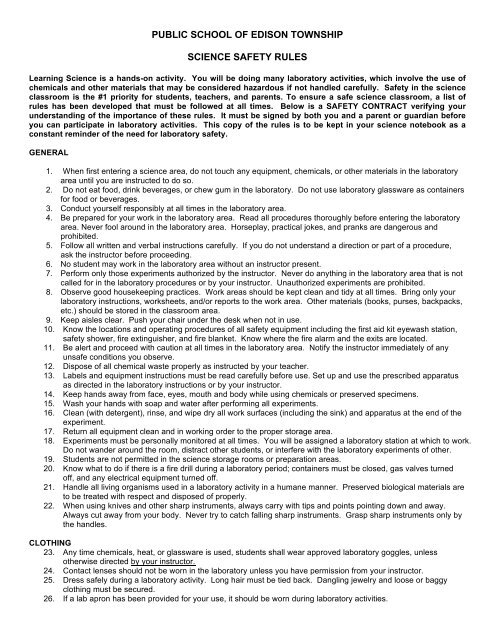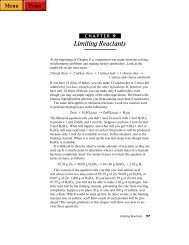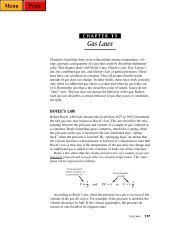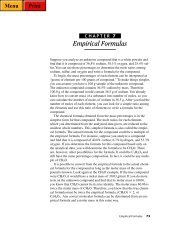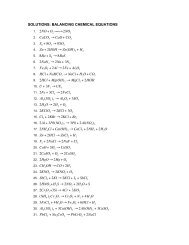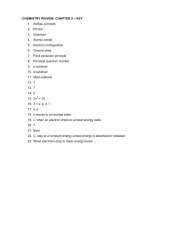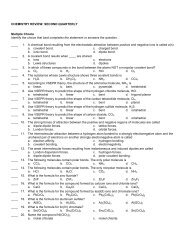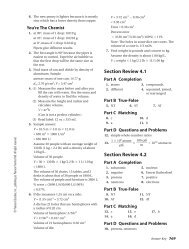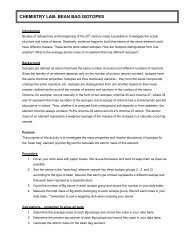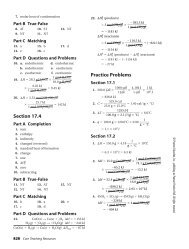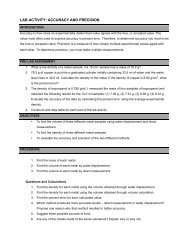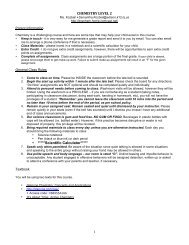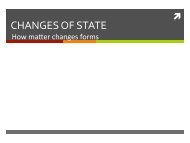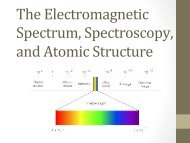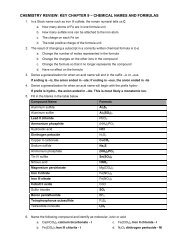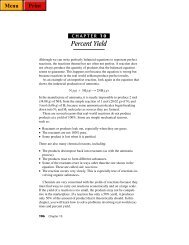PUBLIC SCHOOL OF EDISON TOWNSHIP SCIENCE SAFETY RULES
PUBLIC SCHOOL OF EDISON TOWNSHIP SCIENCE SAFETY RULES
PUBLIC SCHOOL OF EDISON TOWNSHIP SCIENCE SAFETY RULES
You also want an ePaper? Increase the reach of your titles
YUMPU automatically turns print PDFs into web optimized ePapers that Google loves.
<strong>PUBLIC</strong> <strong>SCHOOL</strong> <strong>OF</strong> <strong>EDISON</strong> <strong>TOWNSHIP</strong><br />
<strong>SCIENCE</strong> <strong>SAFETY</strong> <strong>RULES</strong><br />
Learning Science is a hands-on activity. You will be doing many laboratory activities, which involve the use of<br />
chemicals and other materials that may be considered hazardous if not handled carefully. Safety in the science<br />
classroom is the #1 priority for students, teachers, and parents. To ensure a safe science classroom, a list of<br />
rules has been developed that must be followed at all times. Below is a <strong>SAFETY</strong> CONTRACT verifying your<br />
understanding of the importance of these rules. It must be signed by both you and a parent or guardian before<br />
you can participate in laboratory activities. This copy of the rules is to be kept in your science notebook as a<br />
constant reminder of the need for laboratory safety.<br />
GENERAL<br />
1. When first entering a science area, do not touch any equipment, chemicals, or other materials in the laboratory<br />
area until you are instructed to do so.<br />
2. Do not eat food, drink beverages, or chew gum in the laboratory. Do not use laboratory glassware as containers<br />
for food or beverages.<br />
3. Conduct yourself responsibly at all times in the laboratory area.<br />
4. Be prepared for your work in the laboratory area. Read all procedures thoroughly before entering the laboratory<br />
area. Never fool around in the laboratory area. Horseplay, practical jokes, and pranks are dangerous and<br />
prohibited.<br />
5. Follow all written and verbal instructions carefully. If you do not understand a direction or part of a procedure,<br />
ask the instructor before proceeding.<br />
6. No student may work in the laboratory area without an instructor present.<br />
7. Perform only those experiments authorized by the instructor. Never do anything in the laboratory area that is not<br />
called for in the laboratory procedures or by your instructor. Unauthorized experiments are prohibited.<br />
8. Observe good housekeeping practices. Work areas should be kept clean and tidy at all times. Bring only your<br />
laboratory instructions, worksheets, and/or reports to the work area. Other materials (books, purses, backpacks,<br />
etc.) should be stored in the classroom area.<br />
9. Keep aisles clear. Push your chair under the desk when not in use.<br />
10. Know the locations and operating procedures of all safety equipment including the first aid kit eyewash station,<br />
safety shower, fire extinguisher, and fire blanket. Know where the fire alarm and the exits are located.<br />
11. Be alert and proceed with caution at all times in the laboratory area. Notify the instructor immediately of any<br />
unsafe conditions you observe.<br />
12. Dispose of all chemical waste properly as instructed by your teacher.<br />
13. Labels and equipment instructions must be read carefully before use. Set up and use the prescribed apparatus<br />
as directed in the laboratory instructions or by your instructor.<br />
14. Keep hands away from face, eyes, mouth and body while using chemicals or preserved specimens.<br />
15. Wash your hands with soap and water after performing all experiments.<br />
16. Clean (with detergent), rinse, and wipe dry all work surfaces (including the sink) and apparatus at the end of the<br />
experiment.<br />
17. Return all equipment clean and in working order to the proper storage area.<br />
18. Experiments must be personally monitored at all times. You will be assigned a laboratory station at which to work.<br />
Do not wander around the room, distract other students, or interfere with the laboratory experiments of other.<br />
19. Students are not permitted in the science storage rooms or preparation areas.<br />
20. Know what to do if there is a fire drill during a laboratory period; containers must be closed, gas valves turned<br />
off, and any electrical equipment turned off.<br />
21. Handle all living organisms used in a laboratory activity in a humane manner. Preserved biological materials are<br />
to be treated with respect and disposed of properly.<br />
22. When using knives and other sharp instruments, always carry with tips and points pointing down and away.<br />
Always cut away from your body. Never try to catch falling sharp instruments. Grasp sharp instruments only by<br />
the handles.<br />
CLOTHING<br />
23. Any time chemicals, heat, or glassware is used, students shall wear approved laboratory goggles, unless<br />
otherwise directed by your instructor.<br />
24. Contact lenses should not be worn in the laboratory unless you have permission from your instructor.<br />
25. Dress safely during a laboratory activity. Long hair must be tied back. Dangling jewelry and loose or baggy<br />
clothing must be secured.<br />
26. If a lab apron has been provided for your use, it should be worn during laboratory activities.
ACCIDENTS AND INJURIES<br />
27. Report any accident (spill, breakage, etc.) or injury (cut, burn, etc.) to the instructor immediately, no matter how<br />
trivial it may appear.<br />
28. If a chemical should splash in your eye(s) or on your skin, immediately flush with running water from the eyewash<br />
station or safety shower for at least 20 minutes. Notify the instructor immediately.<br />
HANDLING CHEMICALS<br />
29. All chemicals in the laboratory area are to be considered dangerous. Do not touch, taste, or smell any<br />
chemicals unless specifically instructed to do so. The proper technique for smelling chemical fumes will be<br />
demonstrated to you.<br />
30. Check the label on chemical bottles twice before removing any of the contents. Take only as much chemical as<br />
you need.<br />
31. Never return unused chemicals to their original containers.<br />
32. When transferring chemicals from one container to another, hold the containers away from your body.<br />
33. Acids must be handled with extreme care.<br />
34. Handle flammable hazardous liquids over a pan to contain spills. Never pour flammable liquids anywhere near<br />
an open flame or source of heat.<br />
35. Never remove chemicals or other materials from the laboratory area.<br />
36. Take great care when transferring chemicals from one part of the laboratory area to another. Hold the container<br />
securely and walk carefully.<br />
HANDLING GLASSWARE AND EQUIPMENT<br />
37. Never handle broken glass with your bare hands. Use a brush and dustpan to clean up broken glass.<br />
Place broken or waste glassware in the designated glass disposal container.<br />
38. Fill wash bottles only with distilled water and use only as intended, e.g., rinsing glassware and equipment, or<br />
adding water to a container.<br />
39. When removing an electrical plug from its socket, grasp the plug, not the electrical cord. Hands must be<br />
completely dry before touching an electrical switch, plug, or outlet.<br />
40. Examine glassware before each use. Never use chipped or cracked glassware. Never use dirty glassware.<br />
41. Report damaged electrical equipment immediately. Look for things such as frayed cords, exposed wires, and<br />
loose connections. Do not use damaged electrical equipment.<br />
42. Do not immerse hot glassware in cold water; it may shatter.<br />
HEATING SUBSTANCES<br />
43. Exercise extreme caution if using an alcohol burner. Take care that hair, clothing, and hands are a safe distance<br />
from the flame at all times. Do not put any substance into the flame unless specifically instructed to do so. Never<br />
reach over an exposed flame. Light gas or alcohol burners only as instructed by the teacher. Never leave a lit<br />
burner unattended. Never leave anything that is being heated or is visibly reacting unattended.<br />
44. Always turn the burner or hot plate off when not in use.<br />
45. You will be instructed in the proper method of heating and boiling liquids in test tubes. Do not point the open end<br />
of a test tube being heated at yourself or anyone else.<br />
46. Use tongs or heat-protective gloves if necessary. Heated metals and glass remain very hot for a long time. They<br />
should be set aside to cool and picked up with caution.<br />
47. Never look into a container that is being heated.<br />
48. Do not place hot apparatus directly on the laboratory desk. Always use an insulating pad. Allow plenty of time<br />
for hot apparatus to cool before touching it.<br />
Modeled after the Flinn Scientific Inc. Student Safety Contract
STUDENT <strong>SAFETY</strong> CONTRACT<br />
I, __________________________________ ,(print student’s name) have read and agree to follow all of<br />
the safety rules set forth in this contract. I realize that I must obey these rules to insure my own safety, and<br />
that of my fellow students and instructors. I will cooperate to the fullest extent with my instructor and fellow<br />
students to maintain a safe lab environment. I will also closely follow the oral and written instructions<br />
provided by the instructor. I am aware that any violation of this safety contract that results in unsafe<br />
conduct in the laboratory or misbehavior on my part may result in being removed from the laboratory,<br />
detention, receiving a failing grade, and/or dismissal from the course.<br />
Answer the following questions.<br />
Do you wear contact lenses? __________<br />
Do you have allergies? __________ ____<br />
If so, list specific allergies<br />
__________________________________________________________________________________<br />
Student Signature __________________________________ Date _________<br />
Dear Parent or Guardian:<br />
We feel that you should be informed regarding the school’s effort to create and maintain a safe science<br />
classroom/laboratory environment. With the cooperation of the instructors, parents, and students, a safety<br />
instruction program can eliminate, prevent, and correct possible hazards. You should be aware of the<br />
safety instructions your son/daughter will receive before engaging in any laboratory work. Please read the<br />
list of safety rules above. No student will be permitted to perform laboratory activities unless this contract is<br />
signed by both the student and parent/guardian and is on file with the teacher. Your signature on this<br />
contract indicates that you have read this Student Safety Contract, are aware of the measures taken to<br />
insure the safety of your son/daughter in the science laboratory, and will instruct your son/daughter to<br />
uphold his/her agreement to follow these rules and procedures in the laboratory.<br />
Parent / Guardian Signature _____________________________ Date__<br />
Modeled after the Flinn Scientific Inc. Student Safety Contract


